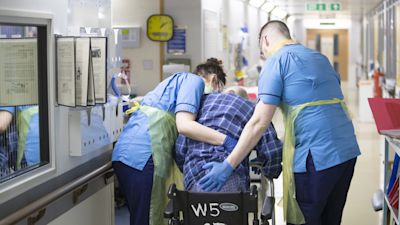Covid cases could soon hit 100,000 a day but ministers resist using Plan B

Two Covid patients tell ITV News Health Editor Emily Morgan they would not be alive if they weren't double-jabbed as doctors highlight the importance of third booster vaccines
The UK could soon be recording 100,000 new coronavirus cases a day, the health secretary has warned, but the government is resisting pressure to implement its Plan B response in England.
Sajid Javid encouraged people to get vaccinated in order to protect the under pressure NHS, which he said is taking on up to 1,000 new coronavirus patients into its hospitals each day.
Covid deaths "remain mercifully low", he said, "but they are sadly still over 100 a day".
Mr Javid added: "This pandemic is not over. Thanks to the vaccination programme, yes the link between cases and hospitalisations and deaths has significantly weakened, but it's not broken."
To protect the NHS through winter, the health secretary said the government would be "redoubling" its efforts to encourage young people to get their first jabs, and vulnerable people to get their booster jab.
The national booking service will also soon be opened up for school children, so the youngest people eligible can get immunised more quickly.
Dr Jenny Harries, head of the UK health security agency, warned hospitalisations and deaths are “moving in the wrong direction” as she urged more vaccine take-up.
Watch Health Secretary Sajid Javid's Covid update in full:
National Medical Director of the NHS Professor Stephen Powis reminded people that "immunity reduces over time...Which is why a booster dose is so important".
At the press conference Mr Javid also announced the UK had secured deals for two new antiviral treatments, which if approved could be "effective treatments by the end of the year for those who have either tested positive for Covid-19 or have been exposed to someone with the virus".
He reiterated that the government will not be implementing its Plan B strategy "at this point" - but he added: "We'll be staying vigilant, preparing for all eventualities while strengthening our vital defences that can help us fight back against this virus."
Praising deals for the new two antiviral treatments as "great news", he added: "But we cannot be complacent when Covid-19 remains such a potent threat."
He said while the UK is "ahead" in the race between the virus and the vaccine, "the gap is narrowing".
"We've come so far thanks to the efforts of so many, but with winter ahead, we can't blow it now."
The UK has the "highest case rate and the highest death rate in Europe", according to former health secretary Jeremy Hunt - and the number of fatalities recorded on Tuesday were the highest since early March.
Prof Powiss said there are currently just over 6,000 patients with Covid-19 in main hospitals "which is back to where we were in the middle of September".
"And I anticipate that over the next week or two that number will increase because infection rates are increasing," he added.
Many experts are urging ministers to respond by implementing Plan B - a set of measures, including a face mask mandate, the government has warned could return if the coronavirus situation gets out of hand.
Plan B could also involve introducing vaccine passports for nightclub entry - and work from home advice could return.
Business Secretary Kwasi Kwarteng ruled out another lockdown this winter, but did not reject the idea that Plan B could be used.
Ministers are "looking at the situation in real time" he said, as he acknowledged "infection rates are rising" - but death and hospitalisation rates are "much, much lower than they were at the beginning of this year and we're learning to live with the virus".
Asked about the prospect of another lockdown, the minister said: "I rule it out."
England's chief medical officer earlier warned people about the winter months ahead.
Chris Whitty said on Twitter that "now is the time" for unvaccinated people to get jabbed and "if you are offered a booster please take up the offer".
He added that "ventilation, masks in crowded indoor spaces and hand washing remain important".
Professor Powis said there is no specific number of Covid-19 hospital admissions which would trigger Plan B.
He said: "There is no one number that we would use to think about triggering interventions because it is more complex than that.
"There is a variety of things that we look at. So we talked about infection rates because they tell us what's likely to happen in the NHS in the next few weeks, we've talked about vaccine effectiveness because that tells us how many people are likely to require hospitalisation.
"And we look at obviously the number of admissions. But we also look at what's happening with flu and other viruses and what's happening with other emergency admissions."